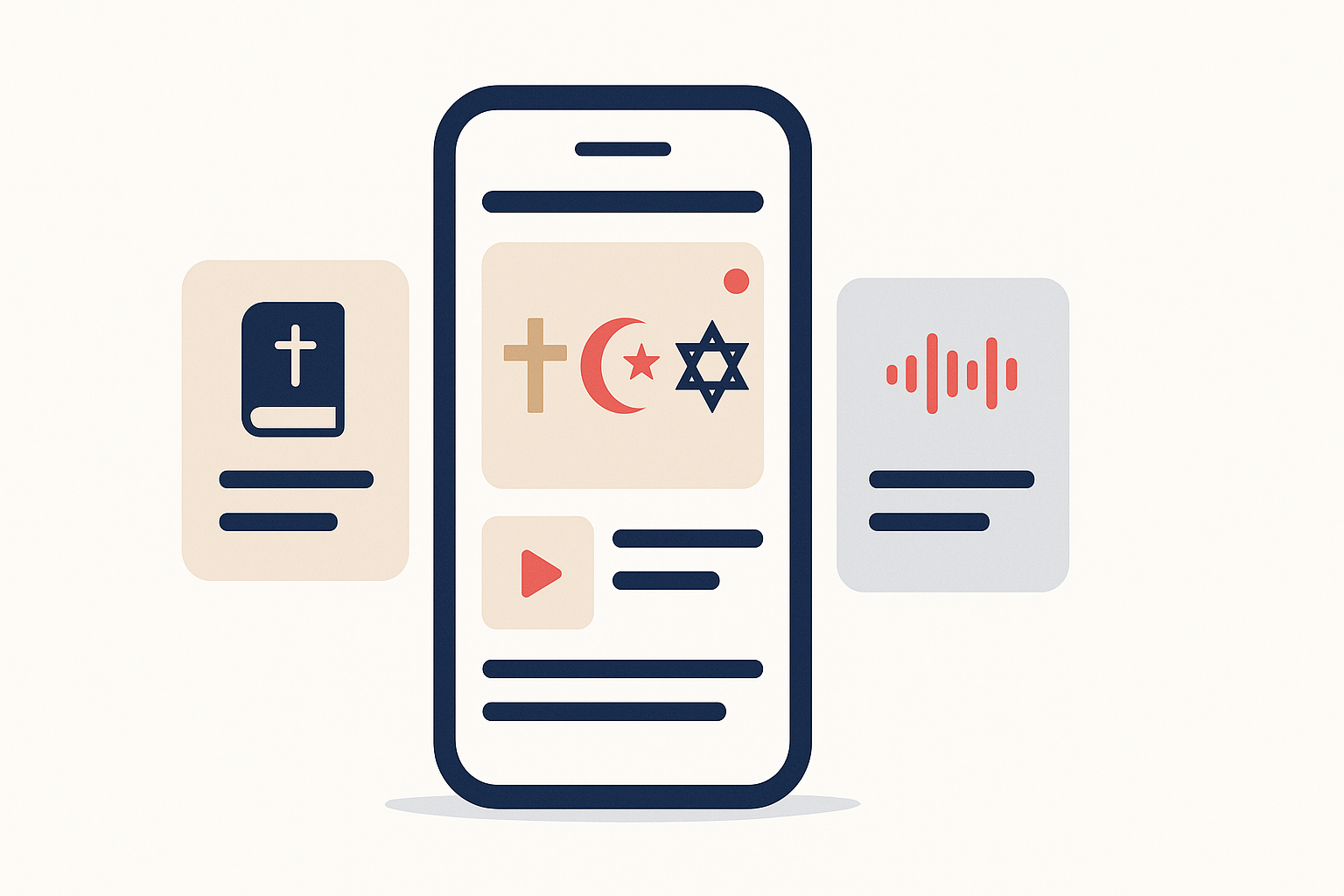How to Build an Interfaith Education App for Spiritual Learning

Digital-first approaches to spirituality and faith education are reshaping how people engage with diverse beliefs. Educators, non-profits, and communities increasingly turn to online platforms to promote interfaith dialogue. Yet, many still struggle with fragmented resources—lectures on YouTube, discussions in podcasts, PDFs for study material—forcing learners to juggle multiple channels. This fragmentation makes it harder to build cohesive lessons about religious diversity, spiritual learning, and mutual understanding.
That’s where Audiorista comes in. It allows you to create a fully branded interfaith learning app without needing to write a single line of code. By combining video, audio, and text, educators can centralize all resources into one digital space. Audiorista’s platform enables you to manage, organize, and deliver diverse content formats in a seamless, user-friendly environment. In this guide, we’ll explore why interfaith education apps matter, how educators and communities use them, and how to build your own religious tolerance education app with tools designed for lasting impact.
Why interfaith education apps matter
Religious diversity and interfaith dialogue play a crucial role in building understanding between communities worldwide. In a globalized environment where learners come from different belief systems, the need for accessible digital resources is greater than ever. Digital platforms help make lessons available to those who can’t attend in-person events, support continuous engagement, and reduce barriers to learning about multiple faith traditions.
Educators face unique challenges when creating curriculums around spirituality and religious diversity. Content often spans several traditions, requiring nuanced presentation. Managing these materials across scattered digital formats further complicates teaching. With interfaith education apps, however, teachers consolidate ideas into one platform that promotes dialogue, highlights differences respectfully, and makes diverse viewpoints accessible for learners everywhere. That’s why search terms such as “religious diversity learning tools” and “teaching interfaith dialogue online” are increasingly relevant for organizations seeking digital-first solutions.
Use cases for interfaith learning platforms
Interfaith education apps aren’t one-size-fits-all—they can be adapted for multiple formats, audiences, and teaching goals. Below are some common use cases where a unified platform for interfaith learning becomes particularly effective:
- Religious studies apps that replicate academic curriculum structures, bringing structured lessons, research-based resources, and assessments into one accessible environment.
- Spiritual education apps for students that focus on daily practices, guided reflections, inspirational content, and inclusive meditation tools to foster spiritual growth.
- Faith-based e-learning platforms that allow religious organizations, NGOs, and interfaith communities to host virtual classrooms for discussions, events, and lectures.
By integrating these different use cases, educators can align their platform with keywords such as “interfaith education app” and “religious diversity learning tools”, ensuring global learners can discover and access their resources more effectively.
Building spiritual education apps without code
Creating an interfaith learning platform no longer requires developers or expensive custom software projects. With Audiorista, you can use a no-code custom education app builder to bring all your materials together in an engaging way. Lessons don’t need to be limited to a single format—educators can integrate text-based readings, audio lectures, and video content into structured, interactive courses. Learners then experience content seamlessly without switching between different channels.
Audiorista’s intuitive drag-and-drop tools, modular content management, and customizable branding ensure that communities and educators can focus on curating meaningful content instead of managing technical complexities. Whether building academic religious studies modules, community reflections, or faith-based discussions, Audiorista provides an accessible platform to scale educational impact. You can Build your interfaith learning app today and take full ownership of how content is delivered and experienced by your audience.
Tools for religious educators and interfaith dialogue facilitators
Non-governmental organizations, seminar leaders, and academic institutions all benefit from tools designed specifically for religious learning. For educators teaching interfaith content, the ability to design structured lessons, introduce subscription-based models for sustainability, and continually update courses is essential. With platforms like Audiorista, content creators maintain full control over their audience and monetization models while ensuring lessons remain relevant over time.
Audiorista supports flexible monetization options, including subscriptions, one-time purchases, and donations, allowing organizations to sustain their educational initiatives. Interfaith dialogues often require flexibility—educators may want to update content based on current events, respond to ongoing discussions, or adjust material when engaging with different communities. A centralized app structure makes these updates seamless. For NGOs and academic programs, this translates into scalable knowledge-sharing without sacrificing accessibility or engagement. Learn more about digital publishing for interfaith educators and see how structured tools can transform the way spiritual and interfaith learning is delivered globally.
Best apps for religious tolerance education
When creating a religious tolerance education app, effectiveness comes from integration, accessibility, and thoughtful design. The best apps provide:
First, an all-in-one publishing platform that allows creators to bring audio, video, and text into a single coherent experience. Second, strong accessibility features so students and learners across all devices can engage fully. Third, community-building features that foster dialogue and mutual learning in respectful, moderated forums. Together, these qualities transform digital spaces into meaningful environments for advancing understanding of different belief systems.
Audiorista brings all these qualities into one platform, empowering educators, NGOs, and faith-based communities to design inclusive education apps. By focusing on direct ownership, ease of use, robust content management, and flexible monetization, Audiorista stands as a leading tool for anyone building an interfaith education app dedicated to tolerance, respect, and dialogue.
Start building your own interfaith education app today with Audiorista—combine audio, video, and text into one powerful learning platform.


